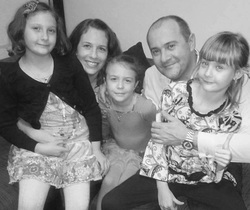 Stephanie and Nika with their three girls. Stephanie and Nika with their three girls. In 2006, Colorado native Stephanie Chachkiani, her triplet infant girls, her husband, and three of everything a baby might need, boarded a plane for a new life in the Republic of Georgia – a former Soviet country with a set of traditional values for women that Stephanie has found makes raising girls easier in some ways and a challenge in others. Sofia, Makayla, and Lucia, now 8, are heading for the tween years in a strongly orthodox culture that expects girls to remain virgins until marriage, marry young, raise and care for children and sick family members, and perform all domestic chores, while sometimes holding jobs. And like in most patriarchal societies, the social and religious doctrines set in Georgia expect a woman to “Obey man, behave as he wishes and place her own wishes and demands second,” according to a report on gender in Georgia by UN Women released last year. The same report also noted that men are generally “more free” than women when it comes to moral standards and a social life. “It is acceptable for men to be in the street at night, whereas similar behaviour is less acceptable for women. It is common for men to have an active social life (for instance, frequent and lengthy feasts), while similar behaviour by women might cause negative comments in the community toward her. It is considered that men unlike women are ‘forgiven’ for more. For instance, society is more tolerant of men cheating, whereas women cheating on men is unacceptable.” While in Georgia’s capital city, Tbilisi (where Stephanie and her family live), women are working, driving, and hanging out with friends, the ideal of the traditional Georgian woman does not always parallel how Stephanie wants her girls treated. She explained, “I do not think that as a whole, women in Georgia are valued for all that they are and do. They are very sacrificial and many of them do not get the respect and appreciation they deserve, especially from the men in their lives. I think they are often taken for granted and held to a different and much higher moral standard than men, often without complaint as that is just the way things have always been.”  Makayla, Sofia, and Lucia before they moved. Makayla, Sofia, and Lucia before they moved. But for Stephanie and Nika - Stephanie’s husband and a Georgian national - the good outweighs the bad when it comes to girls growing up in Tbilisi. Sometimes, Stephanie says, those traditional Georgian values actually make raising girls there easier for them. “Because Georgia is so traditional and girls are expected to be so well behaved or have high moral standards, I actually feel more at ease raising girls in this culture. While, of course, we as parents try to instill high moral standards, values and self-respect in our girls, we all know that society can also play a big role in shaping the life of a person. So, I feel blessed that our girls are able to be raised in such an environment,” Stephanie explains. She also believes that America hasn’t solved the problem of how to raise strong girls either. “As for women in America, I feel, much to our own fault, women are objectified so much on television, the internet and on the streets that says, ‘Look at my body before you get to know me.’ I feel it should be the opposite and I think we are doing a serious harm to our girls when we allow them to think it is okay to dress provocatively. Our bodies are a beautiful gift that should not be shared with the entire world. We can look pretty, even sexy, without having to bare ourselves. That, to me, is sexy!” For Stephanie and Nika, life in Georgia with triplet girls is something they knew they wanted early on. The support system provided by Nika’s family, the way children are received with ease in restaurants and other public places, the affordability of childcare and daily life, and the good aspects of living in an orthodox culture, they explained, made it the best decision for their family.  Stephanie, 6 months pregnant with her triplets. Stephanie, 6 months pregnant with her triplets. “We always knew that we wanted to raise our children here as Georgia is a very warm culture, especially toward children. The fact that we had triplet infants was motivation for us to move here sooner than later, especially because we could afford to have a fulltime nanny help out.” Nika added that there is less helicopter parenting in Georgia, giving kids more space to create strong friendships – something he wants his girls to experience. “I definitely feel that it is a lot safer for my kids to play outside here, compared to the U.S. We don't have to watch over them as hawks from our windows. And I think kids hang out with each other more and become closer friends. Relationships mean a lot in Georgia and I want my kids to grow up surrounded by them and understand their value.” Stephanie said the cultural divide is easier because she and Nika have a more American marriage than traditional Georgian. They spent time before they married getting to know one another at Colorado Christian University where they met – and now work as a team instead of in predetermined roles. “I would say that our marriage definitely follows what would be seen as the typical American norm. In Georgia, often the husband and wife marry early and therefore, do not get a chance to really know and fall in love with and respect one another. From there, they follow the traditional family roles of moving in with the husband's family, and quickly becoming pregnant, the wife stays at home, while the husband works.” Still, Nika said, they do sometimes clash over the smaller things in daily life that they attribute to being raised in different countries. At mealtimes, he said, food that is “normal and tasty to him” might not be to Stephanie. This sometimes influences how the girls feel about certain foods, which can lead to a larger discussion of what should be normal in their house. “There are times when these disagreements lead to conflicts, because we both think that we are right and none of us want to change our opinion and give in. I guess we just need to be more considerate of each other.” But when it comes to raising confident girls, who can make their own life choices, Stephanie says she and Nika are a team and have set their own rules even though Georgia might not be quite on the same page. “An ideal woman for me is a woman who is truly happy in her life, no matter the life she leads/chooses. For some, that may be the stay at home mom who dotes on her husband and children. For others, it may be the independent career woman. I believe that a woman (any person) should be able to live the life he/she chooses. That ideal may not be acceptable or understood by many in this culture, but it is understood by enough to make me feel free to be who I am here. For the rest, I simply don't have the time to care what they might think. This attitude in itself (not living to please or impress others) is not typical for Georgia, but that is slowly changing with time as well and I think it is healthy to have a balance of both. Live a moral life that makes you happy so long as it doesn't harm others around you.” For now, Stephanie says, the girls are thriving and don’t seem bound by the traditional roles around them. When asked what they want to be when they grow up, Lucia replied an artist and a singer, Sofia said she wants to own a bakery where she does her own baking (and possibly also sing and dance), and Makayla wants to be a spy, a forensic scientist, or a clown. By Suzette McLoone Lohmeyer
2 Comments
Howard
3/17/2014 02:09:07 am
'Live a moral life that makes you happy so long as it doesn't harm others around you' -- words to live by regardless of where you live. Thanks for the post.
Reply
Leave a Reply. |
Archives
June 2017
Categories
All
|
 RSS Feed
RSS Feed